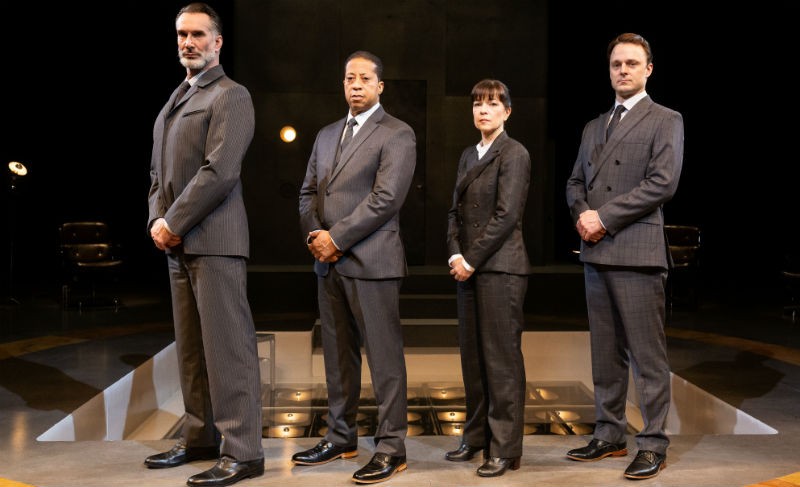The dystopian world of George Orwell's Oceania in the Alley Theatre's production of 1984 isn't as dystopian as it used to be. It's clean and bright and cubic as if a Philip Johnson interior. It has polished gray metallic-like walls, designer lamps for interrogation, a nifty sunken industrial space for the infamous torture chamber, Room 101, and designer leather chairs for the bad guys to sit in when not engaged in their hideous acts of brainwashing and physical suffering. There are shiny chrome ashtrays for the torturers to toss their cigarettes. It's spotless.
Orwell's merrie ol' London of the dire future, except for the four shining white concrete pyramids of each Ministry building (Truth, Love, Peace, and Plenty), used to be a gruesome place of pneumatic tubes, gritty sidewalks, warrens of grimy apartment complexes, constant bombardment, and ubiquitous banners of Big Brother plastered everywhere. Even the minions of the Inner Party, the feared ruling class, didn't live in such decorated splendor as scenic designer Michael Locher gives these polished ruffians.
The look doesn't match what's going on. If that's the intent – to place such horrible acts of degradation and submission inside some swanky corporate office – then I completely missed the implied irony. I saw only a muddled concept, made murkier by the adaptation (2006) by Michael Gene Sullivan.
Is 1984 still taught in high school? Once read, it's never forgotten. Like a nightmare, it bores into you. If Jules Verne was the most prescient writer of the 19th century, then Orwell is the 20th's. Everything he describes about how a decent democracy, after an atomic war, descends into a totalitarian horror show
has seemed to come to pass. No matter on what side of the political aisle you sit, you instinctively shudder at “Big Brother,” “newspeak,” “thought crime,” “double think,” surveillance cameras everywhere, his “telescreens.” After the book's phenomenal international debut in 1949, even the author's name became synonymous with a tyrannical state out to control its people, even its people's own thoughts: Orwellian.
A drudge in the Ministry of Truth, rewriting old newspapers, Winston (Shawn Hamilton/Jay Sullivan) has forbidden stirrings that something isn't right. He remembers dreams from his past, stories so different from what he must edit for the state. Everything in life is controlled, children turn in parents for minor infractions, people disappear without warning and nobody cares, the only true emotion anyone is allowed to show is hate for the enemy.
He meets a girl, Julia (Elizabeth Bunch), and their clandestine trysts in the woods, bombed-out church, or decrepit backroom is the one true touch of freedom for both of them. But love is a dream. They know their affair is doomed but vow never to betray each other. Inevitably, a false friend of the resistance (David Rainey) betrays them and they are caught and taken to the Ministry of Love for their “cure.” Winston's final martydom in Room 101 has the audience shifting nervously in fear. There is no happy ending.
Orwell's ghastly story of the shape-of-things-to-come is certainly presented theatrically. The plot's been expertly edited. Most dialogue, except for Julia's contemporary salt-encrusted language, is lifted verbatim from the novel, and the story progresses exactly as in the book.
What lessens the horror – and Orwell writes horror in detailed, almost languid prose – is that the interrogators also become the characters from Winston's life, popping in and out like a fever dream or interacting in real time with the unseen main interrogator (Chris Hutchison). When he makes his entrance in Act II, he's not at all who we've been led to believe he is. The switch isn't as confusing as it sounds because there's a dramatic reveal involved, but playing fast and loose with what we've seen previously doesn't help. It's an unnecessary bump in the tightening tension.
Perhaps, everything we watch is Winston's hallucinations under torture. The play begins with him in custody, being shocked into confessing as he tells his story. Fettered in electrical cables, Hamilton can't move around the stage, so an avatar, 1st Party Member (Sullivan) doubles for him. When the other party members (Todd Waite, Rainey, Bunch) take over for the people in Winston's tale, we're not sure that they're not acting for the sake of Big Brother who's always watching them. Had author Sullivan written a straight-forward adaptation, as I've seen on stage, would it have more impact? I'm not sure. But this flipping of roles drains the play of its inherent bleakness and realism. We're interrupted, as is poor Winston. He gets somewhat lost among the meta-theater.
The production glistens. Director Rob Melrose knows the exact time to shock us, expertly moving everyone around that deluxe Frankenstein set, electrically lit by Cat Tate Starmer. Cliff Caruthers' music and sound design, full of electronic buzz and heartbeat, adds immeasurable shocks of its own.
It's quite a show. Whether it's Orwell's or Winston's is up for interpretation.
Performances


